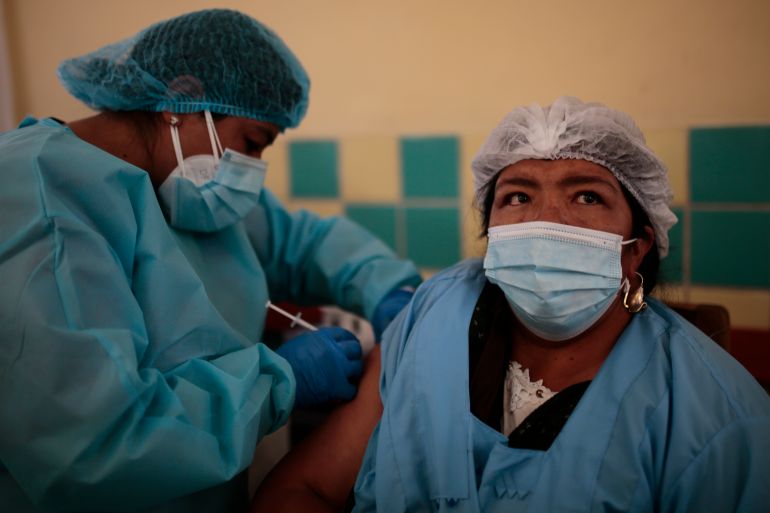With one simple decision, the Canadian government can save lives
Canada can help Bolivia, and the world, defeat COVID-19 by temporarily lifting patent protections for vaccines.

With one simple decision, the Canadian government can save lives. This is the message I want to bring to Canada’s newly re-elected Prime Minister Justin Trudeau.
On May 11 of this year, the Plurinational State of Bolivia signed an agreement with the Canadian manufacturer “Biolyse Pharma” to produce 15 million doses of COVID-19 vaccines using the Jensen vaccine formula of the North American company Johnson and Johnson. The implementation of this agreement depends on the Canadian government carrying out the necessary procedures so that the vaccines can be produced under the compulsory licensing mechanism established by the World Trade Organization (WTO).
Keep reading
list of 4 itemsMexico’s teachers seek relief from pandemic-era spike in school robberies
‘A bad chapter’: Tracing the origins of Ecuador’s rise in gang violence
Why is the US economy so resilient?
The compulsory licensing procedure is now the only way for these vaccines to be produced, since repeated attempts to obtain a voluntary license from the pharmaceutical company holding the patent have been unsuccessful.
If a compulsory license can be obtained and the agreement implemented, Canada and Bolivia would be establishing a path for developing countries to acquire vaccines much quickly and at prices well below the current ones.
Bolivia notified the Council for Trade-Related Aspects of Intellectual Property Rights (TRIPS) of its intention to use the special compulsory licensing system, and Biolyse Pharma is in a position to apply for a compulsory license in Canada under its patent legislation and the provisions of the WTO TRIPS agreement.
This agreement, however, cannot go forward until the Canadian government issues a “compulsory license” for Biolyse to manufacture the vaccine in Canada and export it to Bolivia.
The previous Canadian government did not grant the compulsory license that would allow Biolyse to produce and export the vaccines. This silence was denounced at the Progressive International Summit for Vaccine Internationalism by Canadian opposition MP Niki Ashton, who called it “unacceptable and shameful”.
The COVID-19 pandemic is a threat to us all. People from every nation, every social class, are facing the risk of getting severely ill, dying, or losing their loved ones to the virus. But, unfortunately, not all human beings have the same access to medical supplies and vaccines that can help them protect themselves from COVID-19.
So far, 85 percent of the vaccines administered worldwide have been administered in high and upper-middle income countries and only 1.9 percent of the doses have been administered in low income countries.
This is an alarming statistic, as it shows that we are nowhere near our common goal of vaccinating most of the world’s population against COVID-19 and starting to recover from the tragic impact this pandemic had on our lives.
This is why I am calling on the Canadian government to take action.
Today, we can join forces to ensure that the pharmaceutical patent protection system of the World Trade Organization (WTO) is made less bureaucratic and human life is prioritised before corporate profit. This does not mean doing away with pharmaceutical companies, but rather increasing their production capacity.
People in countries with limited access to COVID-19 vaccines cannot wait to follow the bureaucratic processes for patent release – they are losing their lives and livelihoods to this virus every single day.
As we face an unprecedented global public health emergency, what we need is speed and efficiency. Our inability to move quickly has already caused so much pain – tens of thousands of lives continue to be lost in developing countries due to vaccine shortages.
Canada has experience in leading on this issue. In 2007, it granted a compulsory license for a Canadian company to produce an antiretroviral treatment for HIV/AIDS and export it to Rwanda. So we are hopeful that it will take a similar stance on COVID-19 vaccines.
Since early 2020, the world has been going through an unprecedented health, economic, social and humanitarian crisis. It has been a difficult period for many of us. We have seen clearly the need for unity and collaboration in the face of a global crisis. The pandemic has provided us with an opportunity to reflect on how individuals and countries should behave to counter a threat to our collective future.
This is a time for empathy. This is a time for unity. We can only end this pandemic that is still devastating our world by working together and ensuring that all countries have access to vaccines that can help them stem the spread of COVID-19.
The views expressed in this article are the author’s own and do not necessarily reflect Al Jazeera’s editorial stance.
